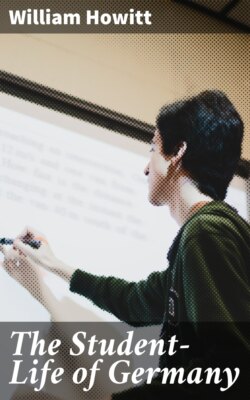Читать книгу The Student-Life of Germany - William Howitt - Страница 16
На сайте Литреса книга снята с продажи.
THE UNION SONG.
ОглавлениеTable of Contents
In happy hour have we united,
A mighty and a German choir!
And hence from every soul excited,
Burst hymns of praise to God once more;
Since we stand here o'er high things musing,
With feelings holy and profound,
So the full heart its joy diffusing,
Must swell with all its chords the sound.
To whom shall first our thanks be pealed?
To God's most high and wondrous name,
Who in our shame's long night revealed,
Arose before us all in flame.
Who blasted all our foes' disdaining;
Our strength and beauty all restored;
Who on the stars for ever reigning,
Sits there from age to age adored.
Our second wish--to whom then flies it?
To Fatherland's high glory whole.
Perdition seize all who despise it,
Hail! he who yields it life and soul!
Through virtues pass it still be-wondered;
Beloved for honesty and right,
Proud from year-hundred to year-hundred,
In strength and honour ever bright.
To joys of German men,--a measure!
One third--in clearer joy and thanks;
For freedom is the German pleasure;
For freedom leads our German ranks.
For it to live, for it to perish,--
Each German bosom burns for this;
For this the hero-death to cherish,
Is German honour, German bliss.
The fourth--in solemn consecration,--
Hands, hearts aloft together go!
Thou ancient truth--and of our nation,
Thou faith, united--"live ye hoch!"
With these all doubts and fears we banish,
These of our bond are rock and shield;
The world indeed itself must vanish,
When men their plighted word shall yield.
Close in,--the sacred circle throng now,
And raise the clash of triumph strong;
From heart to heart, from tongue to tongue now,
Like lightning send this joyful song:--
The Word that knits our bond for ever;
The Good no fiend can from us rend,--
Nor tyrant villany can sever,--
Believe!--maintain it to the end!
The afternoon and evening were dedicated by them to joyous entertainment at the Feurstenkeller, and with testimonies of love and respect towards their teachers, that remarkable and distinguished day terminated. The sacred celebration of the peace-festival on the part of the university, was held on Sunday, the 21st February. The church service itself was very simple, but highly solemn, and worthy of the high thoughts which the celebration of such a day could not fail to call forth. There remained nothing to desire, but that the noble spirit and sterling sentiments which had every where displayed themselves so luminously on that day, should continue to be the universal ruling ones.
So details a newspaper of the time, the celebration of this beautiful festival. But the concluding wish found not its fulfilment in the following year--for in the year 1817 was held the festival on the Wartburg; in the next year the congress of the Burschenschaft at Jena; and in 1819 transpired the bloody deed of Sand, a warning sign of the progress of political fanaticism from its innocent commencement, to that act which found its just reward on the scaffold.
In the year 1817 the celebration of the reformation anniversary falling in conjunction with the anniversary of the Leipsic Folksbattle, it was too exciting an occasion for the young state reformers not to seize on it for the demonstration of their views and aims. The festival was therefore celebrated on the 18th of October, by the students of most of the German universities on the Wartburg, in a manner which quickly excited the attention of the governments. The Prussian government, in particular, ordered the trial of all those who had taken part in the festival; and several professors who had been present, particularly Fries, came under judicial examination. From these trials it was made obvious that the few only were in the secret of the proposed auto-da-fé to be held in Eisenach, but that the majority regarded it as a desirable opportunity for drawing the Burschenschaft into a more intimate and close union, so that it might the more powerfully operate against the landsmanschafts.
The festival was, like the prior one of October, celebrated with much enthusiasm, with sacred service, with singing of Fatherland hymns, and other solemnities: but speeches were delivered, on this occasion, which had not a thoroughly correct tendency, and must appear the more unfitting from the mouth of a teacher of youth. On the evening of the 18th of October, as formerly on that night, fires blazed up on every hill top; but those of the Burschenschaft who had stationed themselves around the fire on the Wartburg, cast into the flames the German History of Kotzebue, as well as some other detested writings. None of the professors, however, were present at this transaction, and none of the speeches connected therewith were delivered by them. That the acts of the Congress of Vienna had been also burnt there, was proved by the inquiry to be false.
The Wartburg festival was concluded on the 19th of October by the assembled participants, to the number of about 600, taking the sacrament in the church. The consequence of this festival was the promotion of the idea here conceived, of one universal German Burschenschaft; that the union of the whole body of student youth must pervade, and be the means of working out, the union of the whole Fatherland.
On the 21st of October, 1818, at Jena, a congress of students, from fourteen universities, was held; then and there the union of the Burschenschafts was discussed, and its constitution established. "One Empire, one Religion, Freedom and Equality!" This was the watchword of the combination, which, since the Wartburg festival, had exchanged its former colours, namely, green, blue, and white, for the union badge, black, red, and a metallic or embroidered oak leaf in the cap. To this circumstance alludes the following celebrated song--
